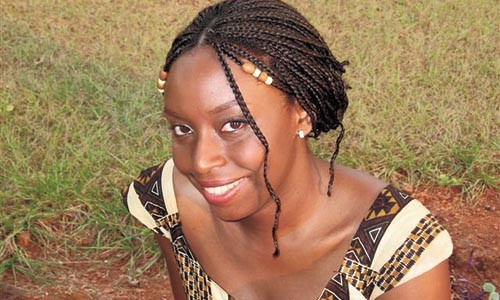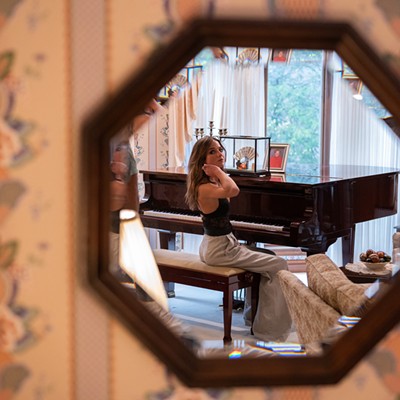Nigerian-born Chimamanda Ngozi Adichie has been called literature's "It Girl" since her bestselling 2003 debut novel, Purple Hibiscus, won the Hurston/Wright Legacy Award, and appeared on the Orange Prize and John Llewellyn Rhys Prize short lists. Her second novel, Half of a Yellow Sun (Knopf, 2006), retells one of the most important but overlooked moments in African post-colonial history -- the genocide and mass starvation of the Igbo, whose nation of Biafra broke from Nigeria in the late 1960s. The war was among the first to receive television coverage in a largely passive West. Adichie chronicles its impact through characters including wealthy twin sisters Olanna and Kainene; a white British man named Richard; Odenigbo, a revolutionary academic; and Ugwu, his houseboy, who acts as the novel's moral center.
Half of a Yellow Sun won the Orange and the PEN Beyond Margins awards, was a National Book Critics Circle finalist and a New York Times Notable Book, and has been translated into 22 languages. Adichie, 29, will speak and read at the Drue Heinz Lecture Series on Mon., Nov. 5. She spoke with City Paper by phone from New Haven, Conn., where she is pursing a master's degree in African studies at Yale.
I was amazed that you were willing to do this book, to get into that emotional space ...
I was compelled to do it. I did so much research that eventually I had to throw out because it was in danger of being one of those books where you learn all the facts but nothing about the people.
You'd already written a short story titled "Half of a Yellow Sun" -- was it the challenge of developing the characters that carried you through four years spent writing the book?
Yes, it was really about the characters, showing the human angle, not romanticizing the war. I wrote the short story to see I was ready. It was a taste to see, could I handle a whole meal?
You grew up in a middle-class, intellectual home, similar to that of the book's main characters. My sister says that back in grammar school, you were great at math. To become a writer, did you have to run away to the U.S.A. to avoid the curse of every good Nigerian student -- med school?
[Laughs.] I actually was in med school for a year, which I hated, so then I switched to pharmacy for a year. I had no background in the things that interested me -- literature, history. But I really wanted to open my mind, so I decided to take the SATs and come to America.
I imagine that people see you as this overnight literary sensation; I remember people who'd been unaware of Nigeria telling me I had to read Purple Hibiscus.
It was so not overnight! Purple Hibiscus is not actually the first book; I couldn't sell that one and put it aside. Agents kept telling me, "I like your writing, but I can't sell you." I had one tell me, "You're black but you're not African American, so I can't sell you as black, and I can't sell you as ethnic, because right now 'ethnic' is Indian." I remember thinking, How can I become Indian? They're always asking you, "You're the next what?" I remember thinking, Perhaps I could be the next Edwidge Danticat, because she's black but not African American.
Some [agents] said, "Just make Nigeria the background but set the story in America."
In Yellow Sun, you don't make any concessions to a Western audience -- then suddenly we get these excerpts of colonial history: a novel within a novel called, The Book: The World Was Silent When We Died. I thought, "Oh, she decided to let Westerners in!"
Yes, I said, Let's let them in, too! [Laughs.] I thought I'd put in a sense of history for the reader. Though when I say "the reader," I don't necessarily mean a particular nationality. Plenty of Nigerians don't know our history.
Nigerians don't study Biafra in school -- there's a gap in the history books between 1967 and 1970. I remember stumbling across the Biafra Museum in Umuahia with a friend who was shocked to learn that such a place existed in his hometown.
Folks don't want to talk about it. They say, "Why are you looking for trouble?" Even I didn't know about the museum until recently. Igbos are still messed up because of the war. We've never faced it.
And were encouraged not to. All the Western news coverage after the war celebrated how quickly Nigeria reunified, how there was no retribution.
I think the West needed to feel that way. After they let Biafra happen, they needed to believe that it all turned out well in the end.
What was the reaction back home? Are they angry you might reinforce Conradian "dark continent" stereotypes about Africa, or proud that you've achieved international acclaim and sparked interest in Nigeria?
When I heard that the book was out in Nigeria, I worried. I thought that when I went back to Lagos, they might throw stones [laughs]. But I've been pleasantly surprised. They're talking about it. They say, "I had no idea!" They're using the novel as an entry point to history. I get e-mails from Kano [site of some of the worst Igbo cleansings] and very few say, "How dare you write this." I've been very pleasantly surprised.
One theme of the novel is the importance of Africans writing their own history. Richard, the white British expat who fancies himself a Biafran, plans to write the story of the revolution, but it becomes apparent that Ugwu, who gets conscripted into the Biafran army, will be the one who does it.
Africans must write their own history. I remember at an event in London, this British man, these ones who imagine they know more about Africa than Africans, telling me, "This is what actually happened," and I said, "Are you seriously telling me my own history?"
Chimamanda Ngozi Adichie at the Drue Heinz Lectures. 7:30 p.m. Mon., Nov. 5. Carnegie Music Hall, 4400 Forbes Ave., Oakland. $23. 412-622-8866 or www.pittsburghlectures.org














